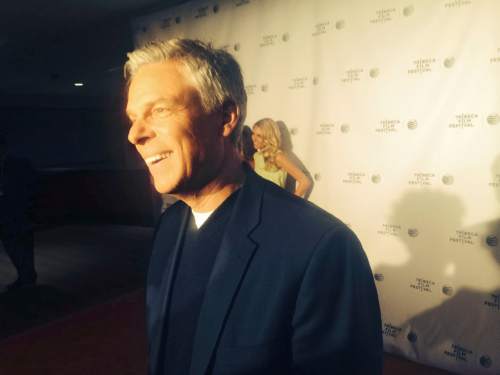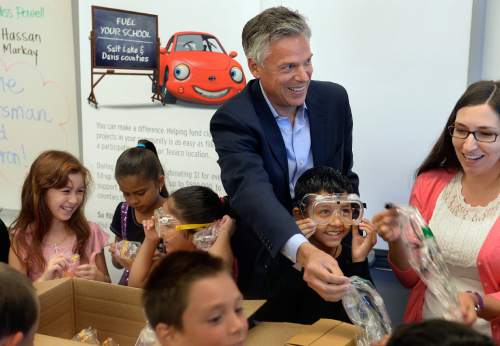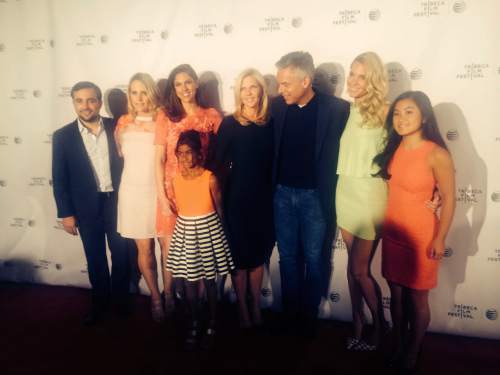This is an archived article that was published on sltrib.com in 2015, and information in the article may be outdated. It is provided only for personal research purposes and may not be reprinted.
New York • U.S. Ambassador Jon Huntsman stood on the red-draped stage in the U.S. consulate in Chengdu, China, addressing a crowd when he invited his adopted Chinese daughter, Gracie Mei, to join him.
"My daughter is a more important ambassador than me," Huntsman says, echoing a major theme in a new documentary about U.S.-China relations premiering this week at the Tribeca Film Festival in New York City.
Gracie, now 15, found stardom in China during the former Utah governor's 18 months as America's top diplomat there — her dad jokes a billion Chinese people probably know her name — and her status carries over in the film, which captures the critical, but often dicey, bond between the two superpowers.
Gracie is only one part of the documentary — Huntsman and a Chinese dissident round out the storyline — but the girl's return to China in 2009 with her family and a hero's welcome at her one-time orphanage offer a powerful side note to the impact of U.S. policy on Beijing and its policies toward America.
The teenager, abandoned as an infant in a vegetable market and adopted at 6 months of age by one of the more affluent American families, speaks little Chinese herself, something she says in the documentary that embarrasses her when people assume she's fluent.
But she's proud of the role she gets to play: a Chinese-born American brought on the world stage as a girl who has the ability to do what her counterparts in her home country can't.
"I'm free to speak the truth," Gracie says, nearly breaking down behind a microphone where she helps narrate "All Eyes and Ears," a documentary years in the making by director Vanessa Hope and co-produced by Geralyn White Dreyfous, head of the Utah Film Center.
One can document the challenging relationship between the two countries through high-profile incidents or, as Hope does with this film, tell the story with individuals in key roles to shape the future of the connection.
Huntsman, who had returned Thursday from a visit to Beijing, said he wasn't sure how the film would turn out, but he praised Hope after its screening.
"She kind of weaved everything together in a way that illustrates the complex nature of the relationship," Huntsman told the crowd during a question-and-answer session.
Much of the filming took place before Huntsman left his ambassador post in 2011. News of the film brought some criticism during his short-run bid for the presidency, but the documentary turned out less about Huntsman and his work as a diplomat than about his daughter's intriguing role.
In the movie, he said that his goal, like that of his predecessors, was to leave China better than he found it.
"Everyone wants this relationship to work," he said. "It's too important to the world."
One of the more emotional parts of the film follows Gracie's return to Yangzhou, where she was born. The former orphan was greeted with drums, fireworks and giant banners. "Welcome back home" they say in English and Mandarin. She walks a red carpet, plants a tree and is surrounded by young girls who want a hug.
Video of wooden cribs and infants comes next and Gracie's mood shifts.
"I worry about all the ones who didn't get adopted like I did," she says. "What happens to them? This feels like 'The Hunger Games.' It's my favorite book."
Gracie is shy, but she often accompanies her father on trips as shown in the film. Huntsman considers her both Chinese and American, noting that she would make a great future U.S. ambassador but that Gracie would rather be an artist, cure cancer (as has become the life's mission of her grandfather, Jon Huntsman Sr.) or befriend pandas.
Cut to Gracie visiting a zoo and giggling while petting a panda.
One young girl, of course, doesn't represent the whole of the complex relationship between America and China, of course, but Hope, the director, says Gracie was able to symbolize both points of view because she "straddles both worlds."
"It is our goal," Hope said, "that the film will challenge harmful negative stereotypes, demystify what the relationship between the two countries has meant and can mean, and bring energy, empathy and urgency to the public dialogue around the growing international debate about China's rise and increasingly assertive international behavior."
The tales of Huntsman and Gracie intersect in some ways with the other key player, Chen Guangcheng, a blind legal advocate under house arrest after bringing attention to forced abortions in China — attention that yielded a surge of orphaned girls such as Gracie.
Huntsman had been denied the ability to see Chen during his time as ambassador.
The filmmakers, too, faced difficulties with Chinese authorities, stymied on occasion trying to shoot video. They interviewed Chen only after he escaped his minders, sought amnesty in the U.S. Embassy and was allowed to relocate to America.
Chen noted that there are now some 200,000 mass protests in China every year.
"This is a concrete expression of political activism," he says, noting that his people will not stand for continued oppression. Key to that, he says, is for America to put human rights ahead of its own economic interests.
Gracie, after Thursday's screening, was asked by an audience member with an adopted Chinese daughter if she should take the girl to visit her homeland.
"I think you definitely should," the teen said. "It was a great experience for me."
An experience caught on camera now for everyone to see.









